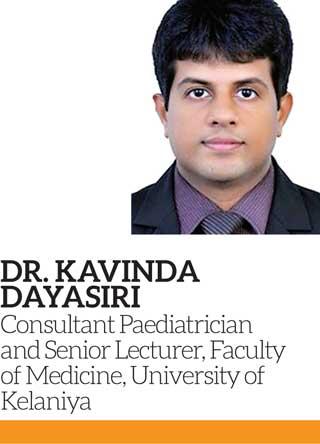03 Sep 2021 - {{hitsCtrl.values.hits}}
 With the rising number of COVID positive patients home based care of patients, having a minimal risk for complications, is the current trend in COVID management. But, having to care for a child, who became positive for COVID at home, can be an extremely stressful situation for a parent. Thus, we are interviewing Dr.Kavinda Dayasiri, Consultant Paediatrician and Senior Lecturer, Faculty of Medicine, University of Kelaniya, in order to traverse the important points of home based care of COVID positive children.
With the rising number of COVID positive patients home based care of patients, having a minimal risk for complications, is the current trend in COVID management. But, having to care for a child, who became positive for COVID at home, can be an extremely stressful situation for a parent. Thus, we are interviewing Dr.Kavinda Dayasiri, Consultant Paediatrician and Senior Lecturer, Faculty of Medicine, University of Kelaniya, in order to traverse the important points of home based care of COVID positive children.
Choosing children for home based care
COVID positive children, who are over two years of age, either asymptomatic or mildly symptomatic, such as having just a cold, mild fever and cough are eligible for home based care. They should have no known chronic medical illnesses and have safe family environments for home based monitoring and management.
Children with certain underlying medical problems are not eligible for home based management even if they are asymptomatic. Children with chronic lung, liver or kidney disease, immunodeficiency, uncontrolled asthma, cerebrovascular disease, diabetes mellitus, obesity, significant metabolic, genetic or heart disease or any serious medical illness are some such examples.
If your child’s age is less than two years, he or she needs to be assessed by a doctor on the paediatric team for the suitability of home based care.
Caring for a sick child at home
Your child needs to be observed regularly and a responsible parent or caregiver should be available at all times during home stay. Ensure enough ventilation and sunlight in your child’s room. Ensure adequate intake of fluids and sleep and rest for the child. A balanced diet is recommended since it provides micronutrients which can boost your child’s immunity to fight infections. Maintaining good hygiene is important; not only to prevent the spread of COVID, but also to prevent acquisition of secondary infections.
Monitoring the Child
Check your child’s temperature every six hours and actively look out for any difficulty in breathing or feeding difficulties, reduced activity or excessive sleepiness.
If a pulse oximeter is available at your home, you can monitor peripheral oxygen saturation in your child. Having a saturation of less than 96% in room air means that your child is having COVID of at least moderate severity and you should seek medical care immediately.
Medication for children being cared for at home
You can give a weight appropriate dose of paracetamol for fever and antihistamines for common cold and mild cough. If your child is on a long-term medication such as inhalers for well controlled asthma, continue with them. Avoid giving non-steroidal anti-inflammatory medications such as ibuprofen, a steroid such as prednisolone or dexamethazone and antibiotics without medical advice.
Prevention of transmission to others
It is important that all family members follow safety measures whenever possible at home. This will prevent the spread of infection to the unaffected. The actions that you can take to prevent infection within home include regular use of sanitizers, wearing of facemasks indoors and frequent hand washing.
Keep windows open during daytime to allow enough ventilation and natural light. Avoid sharing belongings with each other during home stay and have separate bedding, clothing, and personal care items for your child.
Home based care means that your child needs to stay at home at all times as it will prevent spread of infection to others. However, having COVID does not mean that your child will need to stay in complete social isolation. Making use of electronic communication media appropriately to engage with loved ones and the world and allowing children to engage in indoor hobbies can make their convalescent as stress free as possible.
Seeking Hospital Care
Parents should be on high alert for signs which require medical care/hospitalization and seek urgent help as needed.
Seek medical attention early if your child develops high fever, worsening cough or any degree of difficulty in breathing as these signs may indicate COVID pneumonia.
It’s observed that children presenting with certain signs and symptoms such as appearance of red lips and red eyes are more likely to suffer from severe disease and thus require medical attention.
Any seriously ill child, including children who are having severe COVID disease, will stop feeding; become less active; sleepy and pass less urine.
COVID is also known to present with tummy pain, vomiting and diarrhoea in children and thus it is important not to downplay these symptoms as just a stomach bug.
Since COVID is evolving globally with differently invasive variants, there are still gaps left to be understood about how precisely it can affect a child. Therefore, if you’re concerned about your child please bring your concerns to medical attention. You can call 1390 or the closest government hospital for medical advice. If you think your child is seriously ill rush to the closest hospital using a private vehicle or dial 1990 for an ambulance.
Importance of taking care of mental health
A diagnosis of COVID in your child can adversely affect the psychological health of not only the child, but that of family members as well. The fear of your child developing complications and needing hospitalization for advanced care can often be intense. Therefore, it is important to take good care of both physical as well as psychological health of all family members during home stay.
Your child might enjoy food, reading books, playing indoors, talking to friends and family online and engaging in hobbies. Since none of these are restricted, make use of these fun activities to keep your child happy during home isolation. Your child may feel quite frustrated at times due to strict home based care. Therefore, as parents, it is important to understand this and maintain a tender loving relationship and having enough time to be with them to keep them as comfortable as possible.
Long-COVID 19 in children
Many parents worry about the long-term effects of COVID-19 on their children. However, much remains to be studied in the times to come, given that the pandemic runs back to just two years. Some studies have shown that children may feel increased tiredness, and have difficulty in concentrating and the increased need for sleep occasionally, after recovering from the infection. Therefore, it is important to be vigilant of the child’s health even after complete recovery from COVID 19 infection.
Take Home Message
It’s possible to successfully manage a COVID infected child who was deemed suitable for home based care, at home in most instances. Frequent monitoring, a balanced diet and adequate fluid and weight appropriate paracetamol and anti-histamines when needed are important during home based care. Identifying danger signs early and seeking early medical help can minimise the risk of complications of COVID in children who are being cared for at home.
20 Dec 2024 9 hours ago
20 Dec 2024 20 Dec 2024
20 Dec 2024 20 Dec 2024
20 Dec 2024 20 Dec 2024
20 Dec 2024 20 Dec 2024